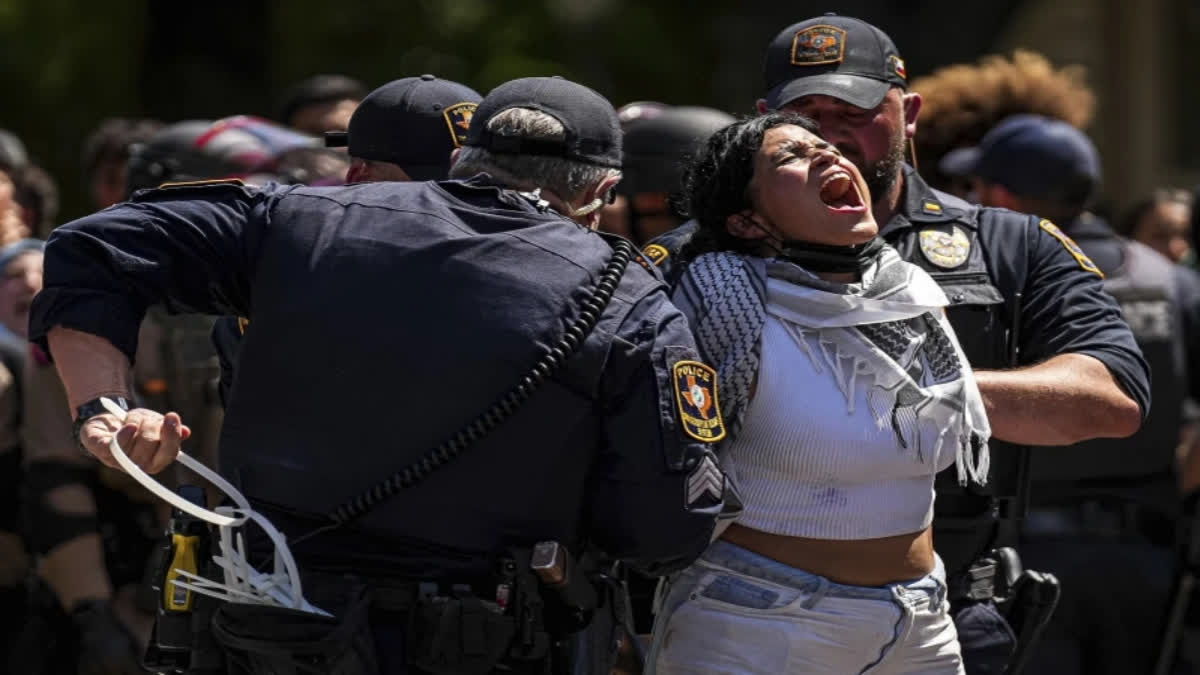New York: Officers took protesters into custody late Tuesday after Columbia University called in police to end the pro-Palestinian occupation on the New York campus. The scene unfolded shortly after 9 p.m. as police, wearing helmets and carrying zip ties and riot shields, massed at the Ivy League university's entrance. Officers breached Hamilton Hall, an administration building on campus, to clear out the structure.
The demonstrators had occupied Hamilton Hall more than 12 hours earlier, spreading their reach from an encampment elsewhere on the grounds that's been there for nearly two weeks. Shortly before officers entered the campus, the New York Police Department received a notice from Columbia authorising officers to take action, a law enforcement official told The Associated Press. The official was not authorised to discuss details of the matter publicly and spoke on condition of anonymity.
The NYPD's move came hours after the department's brass said officers wouldn't enter Columbia's campus without the college administration's request or an imminent emergency. Columbia's protests earlier this month kicked off demonstrations that now span from California to Massachusetts. As May commencement ceremonies near, administrators face added pressure to clear protesters.
More than 1,000 protesters have been arrested over the last two weeks on campuses in states including Texas, Utah, Virginia, North Carolina, New Mexico, Connecticut, Louisiana, California and New Jersey, some after confrontations with police in riot gear. Walk away from this situation now and continue your advocacy through other means, New York City Mayor Eric Adams advised the Columbia protesters on Tuesday afternoon before the police arrived. This must end now.
The White House earlier Tuesday condemned the standoffs at Columbia and California State Polytechnic University, Humboldt, where protesters had occupied two buildings until officers with batons intervened overnight and arrested 25 people. Officials estimated the northern California campus' total damage to be upwards of $1 million.
President Joe Biden believes students occupying an academic building is absolutely the wrong approach and not an example of peaceful protest, said National Security Council spokesperson John Kirby. Other colleges have sought to negotiate agreements with the demonstrators in the hopes of having peaceful commencement ceremonies. As cease-fire negotiations appeared to gain steam, it wasn't clear whether those talks would inspire an easing of protests.
Northwestern University notched a rare win when officials said they reached a compromise with students and faculty who represent the majority of protesters on its campus near Chicago to allow peaceful demonstrations through the end of spring classes. The nationwide campus protests began at Columbia in response to Israel's offensive in Gaza after Hamas launched a deadly attack on southern Israel on Oct. 7. Militants killed about 1,200 people, most of them civilians, and took roughly 250 hostages.
Vowing to stamp out Hamas, Israel has killed more than 34,000 Palestinians in the Gaza Strip, according to the local health ministry. Israel and its supporters have branded the university protests as antisemitic, while Israel's critics say it uses those allegations to silence opposition. Although some protesters have been caught on camera making antisemitic remarks or violent threats, organisers of the protests, some of whom are Jewish, say it is a peaceful movement aimed at defending Palestinian rights and protesting the war.
On Columbia's campus, protesters locked arms early Tuesday and carried furniture and metal barricades to Hamilton Hall, among several buildings that were occupied during a 1968 civil rights and anti-Vietnam War protest. Demonstrators called the building Hind's Hall, honoring a young girl who was killed in Gaza under Israeli fire.
